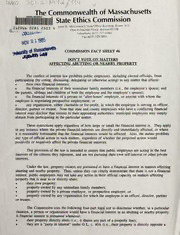Table Of Content9
The Commonwealth of Massachusetts
IMUMASHS/AMHEBRST i Commission
State Ethics
,31n2nDibb, nOE-fmlrS 2-.5rn0-3, M JohnW.MOcnCeorAsmhabcukrtSotnatePlOafcfe,icBeoBsutioIndm0g2,10R8oom 61
oOUX^UV'' Telephone(617) 727-0060
Fax(617)723-5851
COMMISSION FACT SHEET #6
•W**^
DON'T VOTE ONMATTERS
AFFECTING ABUTTING OR NEARBY PROPERTY
The conflictofinterest law prohibits public employees, including elected officials, from
participating (by voting, discussing, delegating orotherwise acting) in any matterthat affects:
• theirown financial interests;
• the financial interests oftheirimmediate family members (i.e., the employee's spouse; and
theparents, siblings and children ofboth the employee and the employee's spouse);
• the financial interests ofa private or "after-hours" employer, oranyone with whom the
employee is negotiatingprospective employment; or
• any organization, eithercharitable orfor-profit, in which the employee is serving as officer,
director, partner ortrustee. Note that state and county employees who have a conflicting financial
interest mustdisclose that interest to theirappointing authorities; municipal employees may simply
abstain from participating in theparticular matter.
These restrictions apply regardless ofhow large or small the financial interest is. They apply
in any instance where the private financial interests are directly and immediately affected, orwhere
it is reasonably foreseeable thatthe financial interests wouldbe affected. Also, the statuteprohibits
any type ofofficial action in such matters, regardless ofwhether the proposed action would
positively ornegatively affecttheprivate financial interests.
This provision ofthe law is intended to ensure thatpublic employees are acting in the best
interests ofthe citizens they represent, and are notpursuing theirown self-interest orotherprivate
interests.
Underthe law, property owners arepresumedto have a financial interest in matters affecting
abutting and nearby property. Thus, unless they can clearly demonstrate that there is nota financial
interest, public employees may nottake any action in theirofficial capacity on matters affecting
property that is nearto ordirectly abuts:
• theirownproperty;
• property owned by any immediatefamily members;
• property owned by aprivate employer, orprospective employer; or
• property owned by any organization forwhich the employee is an officer, director, partner
ortrustee.
The Commission uses the following four-part legaltest to determine whether, in aparticular
situation, aperson ororganization would have a financial interest in an abutting ornearby property.
A financialinterest ispresumed whenever:
• theirproperty directly abuts (i.e., it shares any part ofaproperty line);
• they are a "party in interest" under G.L. c. 40A (i.e., theirproperty is directly opposite a
street, public way orprivate way, orthey are an abutterto an abutterwithin 300 feet ofthe
property line);
• they are a "person aggrieved" forthepurposes ofG.L. c. 131, theWetlands Protection Act
(see 310 CMR 10.04); or
• the matterwould otherwise altertheirproperty value, rights, orutilization. Forexample,
property owners are presumed to have a financial interest in zoning changes, variances, nearby
subdivision ordevelopment approvals, and roadway, sewerage or safety improvements.
Three statutory exemptions can, in certain instances, allow public employees to take official
actions which would otherwise beprohibited:
• Public employees may act on matters ofgeneral legislation, and certain home-rulepetitions.
Forexample, public employees may draft, promote oroppose general legislation, orlegislation
related to a municipal government's organization, powers, duties, finances orproperty. Note that
matters involving othertypes of "special legislation", regulations oradministrativepolicies arenot
eligible forthis exemption. Formore informationaboutthis exemption, orfora determination as to
whethera bill is "general legislation" or "special legislation", contact yourcity solicitorortown
counsel, youragency legal counsel orthe Legal Division ofthe State Ethics Commission.
• Before taking an officialaction regarding an abuttingproperty, anappointedemployee must
advise his appointing authority ofthe nature oftheprivate financial interest in the matter, and
receive a written determination from the appointingauthority thatthe interest involved "is not so
substantial as to be deemed likely to affectthe integrity ofthe services" which thepublic expects
from theemployee. State and county employees must filecopies ofthese determinations with the
State Ethics Commission. This exemption is notavailable to elected officials.
• A municipalemployee may act on municipal ordinances, bylaws and other matters of
"general policy", provided thatthe issue affectingtheprivate financial interests also affects a
"substantial segment" ofthe municipality's population. The Ethics Commission has previously ruled
that 10% ofa municipality'spopulation is a "substantial segment" forthepurposes ofthe conflict
law; therefore, municipalemployees may clearly act on matters affecting theirown financial
interests, orotherprivate interests, ifthe matteralso affects at least 10% oftheir municipality's
residents (as determined by the most recent census). Note, however, thatthere is no legalprecedent
precisely definingthepercentage that would constitutea "substantial segment" ofthepopulation.
Formore informationabout this exemption, orfora ruling as to whetherapopulation segment
smallerthan 10% is "substantial", please contactthe Legal Division ofthe State Ethics Commission
at (617) 727-0060.
* #
Commission Fact Sheets are prepared and issued by the Public Education Division ofthe State
Ethics Commission. They are intended toprovide guidance to public officials and employees
concerningpractical applications ofthe conflictlaw. Formore information, please contactthe
Legal Division ofthe State Ethics Commission at (617) 727-0060.
ISSUED: November 1987
REVISED: October 1991
REVISED: August 1994

